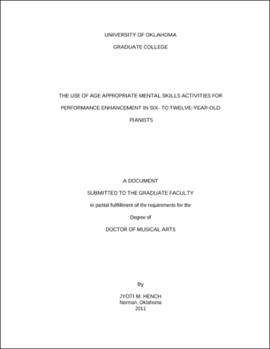| dc.contributor.advisor | Magrath, Jane||Moore, Bill | |
| dc.creator | Hench, Jyoti | |
| dc.date.accessioned | 2019-04-27T21:34:43Z | |
| dc.date.available | 2019-04-27T21:34:43Z | |
| dc.date.issued | 2011 | |
| dc.identifier | 99310000402042 | |
| dc.identifier.uri | https://hdl.handle.net/11244/319051 | |
| dc.description.abstract | Music performance psychology research to date has largely focused upon advanced performers such as professional musicians and collegiate music majors. Relatively little performance psychology research has focused upon children, although children - including piano students - are usually expected to perform as a part of music study. The current study focuses on youth performance psychology by addressing the use of mental skills training in pre-adolescent pianists. | |
| dc.description.abstract | The author surveyed literature relating to youth performance psychology, including the topics of motivation in youth sport and music study, general anxiety and performance anxiety in children, and mental skills training for children in sport and in the classroom. The author then applied findings from this literature to create a set of mental skills activities designed to enhance performance in six- to 12-year-old pianists. | |
| dc.description.abstract | Thirty-one mental skills activities, developed by the author, address the four important skills of positive attitude, relaxation, imagery, and concentration. These activities are presented in a student workbook format in Chapter Three, and in a teacher manual format in Chapter Four. The activities are designed for use during lessons, practice sessions, and performances over a period of one year or longer as a student's playing level and cognitive ability progress. Of the 31 activities, four address positive attitude, five address relaxation, 15 address imagery, and seven address concentration. Some activities involve repertoire, while others do not. Repertoire-specific activities feature elementary through intermediate level works by educational composer Jon George (1944-1982), since George's music has continued to be used and respected by teachers for more than three decades. | |
| dc.description.abstract | The activities include numerous age-appropriate applications of mental skills: creating and using affirmations; engaging in positive post-performance reflection; completing a visualization script or performance script; using imagery to relax various parts of the body; mindful breathing; using pictures to enhance learning, performance, and memorization; musical storytelling; mental rehearsal, including multi-sensory imagery; using cue words; practicing focusing, refocusing, and shifting focus as distinct skills; creating and implementing a multi-part performance strategy. | |
| dc.description.abstract | The current study provides practical activities to help piano teachers regularly incorporate mental skills training into their young students' lessons, practice sessions, and performances. In addition, these activities may serve as a foundation for future research involving mental skills training in pre-adolescent musicians. | |
| dc.format.extent | 430 pages | |
| dc.format.medium | application.pdf | |
| dc.language | en_US | |
| dc.relation.requires | Adobe Acrobat Reader | |
| dc.subject | Piano--Instruction and study--Juvenile | |
| dc.title | The Use of Age Appropriate Mental Skills Activities for Performance Enhancement in Six- to Twelve-Year-Old Pianists | |
| dc.type | text | |
| dc.type | document | |
| dc.thesis.degree | D.M.A. | |
| ou.group | Weitzenhoffer Family College of Fine Arts::School of Music | |
